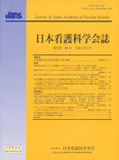Japanese
English
- 販売していません
- Abstract 文献概要
- 参考文献 Reference
- サイト内被引用 Cited by
要旨
目的:神経難病患者をケアする看護師の職場環境改善への示唆を得るために,バーンアウト因果モデルを作成し検証することである.
方法:神経難病専門病棟に勤務する看護師385名を対象として郵送調査を実施し,共分散構造分析でバーンアウト因果モデルの検討を行った.
結果および結論:有効回答数は248部であった.分析の結果,バーンアウトに影響を及ぼす仕事ストレッサーは,「仕事の量的負荷」と「上司との軋轢」であった.神経難病看護経験3年未満で「言語的暴力」が「シニシズム」に直接的影響を,また3年未満で「関わりの難しさ」,3年以上で「ケア見通しの不明瞭さ」がバーンアウトに間接的影響を及ぼしていた.バーンアウト後は,離職・配置転換意思が強まるが,3年未満は「同僚との軋轢」,3年以上は「仕事の量的負荷」と「言語的暴力」が離職・配置転換意思に直接的影響を及ぼしていた.3年未満の場合,職場内サポートの弱さは,離職・配置転換意思に直接的に影響していたため,経験の少ない看護師にとってサポートはより重要であると考えられた.以上より,職場環境改善には,職場全体の対策に加えて,難病看護経験年数に応じた対策が必要であることが示唆された.
Abstract
Purpose: The purpose of the present study was to develop a Burnout Causal Model, to verify the fitness of this model and to provide suggestions for improving work-related environments for nurses caring for patients with intractable neurological illness.
Methods: Subjects comprised 385 nurses working in the intractable neurological illness ward. The study was conducted by self-administered questionnaire sent by mail. A Burnout Causal Model was examined via Structural Equation Modeling.
Results and Conclusion: There were 248 valid responses. Job stressors influencing burnout were “Quantitative workload” and “Conflict with superiors.” Among nurses with less than 3 years of experience nursing patients with intractable neurological illness, “Verbal abuse” influenced burnout directly, whereas “Difficulty of involvement” influenced burnout indirectly. “Uncertainties regarding prospects of care” indirectly influenced burnout in nurses with 3 or more years of experience nursing patients with intractable neurological illness. Burnout led to turnover/reshuffle intention. “Conflict with colleagues” directly influenced turnover/reshuffle intention in nurses with less than 3 years of experience, compared to “Quantitative workload” and “Verbal abuse” for nurses with 3 or more years of experience. Among nurses with less than 3 years of experience nursing patients with intractable neurological illness, turnover/reshuffle intention is strengthened if workplace supports are weak. Supports in the workplace are thus important for nurses with little experience. These findings indicate that measures need to be based on years of experience nursing patients with intractable neurological illness.
Copyright © 2009, Japan Academy of Nursing Science. All rights reserved.


